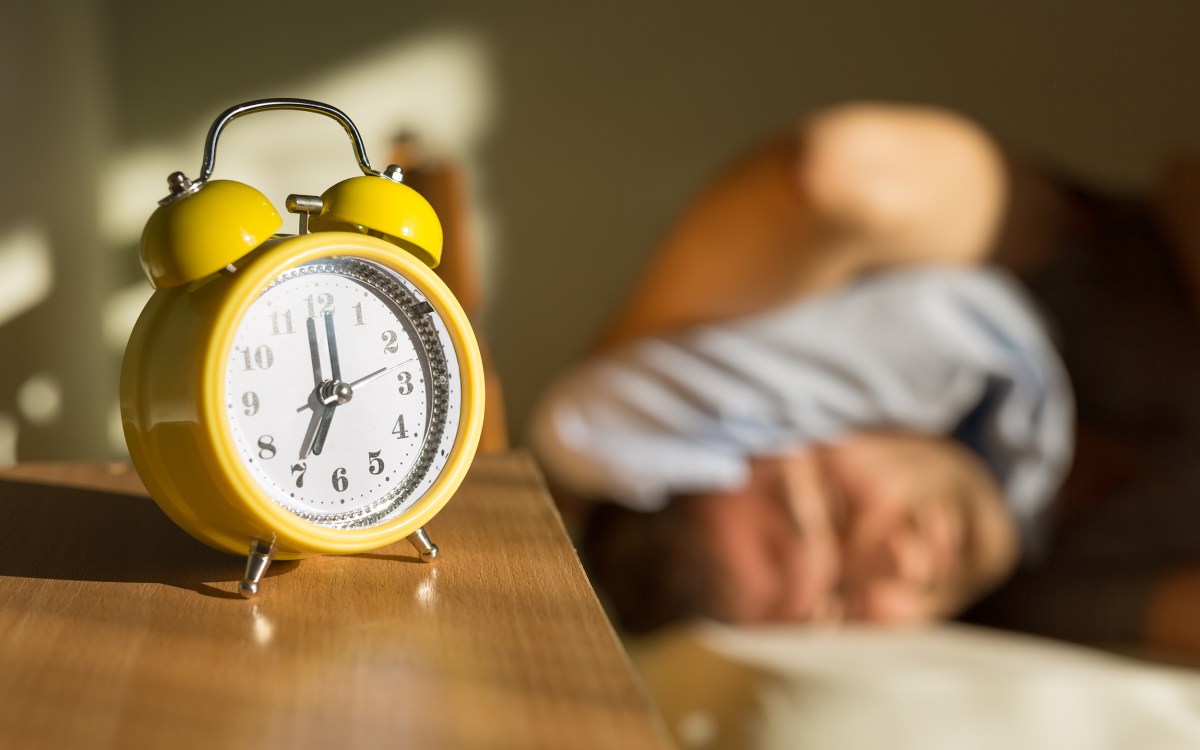Not getting enough sleep? That’s only half the battle.

Researchers find regularity also aids physical, emotional health, cognitive performance, and catching up on weekends can help
Americans have become increasingly aware of the fact that they just don’t get enough sleep. However it turns out that’s not the whole story. Duration is important but so is regularity.
That was one of the conclusions of a recent panel of the National Sleep Foundation that featured several Harvard-affiliated researchers, including Matthew Weaver, a member of the Brigham and Women’s Hospital’s Division of Sleep and Circadian Disorders, a Harvard Medical School instructor in medicine, and co-first author of the panel’s report, released earlier this month.
Weaver told the Gazette that an extensive review of studies showed that duration and regularity of sleep hold important benefits for both long-term health and daily performance in our lives. This interview was edited for clarity and length.
Q&A
Matthew Weaver
Gazette: Are we getting better at sleeping as a nation?
Weaver: I think public awareness has certainly gone up, which is great. But a lot of the structural things that keep us from getting enough sleep remain unchanged. There is movement in that area. We love to see high school start times being pushed later in states like California and Florida, allowing kids to get more sleep. Before the pandemic, about two-thirds of the U.S. population was not sleeping enough. During the pandemic, there was a shift in sleeping patterns. Sleep timing shifted later; wake times shifted later too; and people tended to be sleeping a bit longer on average. We saw that as a very positive thing, and there is some evidence that people who did extend their sleep during the pandemic were less likely to report adverse mental health symptoms. It remains to be seen whether those extended sleep patterns are being maintained now, though early evidence suggests we’re regressing back to where we were before.
Gazette: Is that because we’re transitioning back to the office and work from home was such a big factor?
Weaver: Flexible work hours are a major factor. There are inter-individual differences in the timing and duration of our sleep that are guided by our circadian rhythms. During the pandemic, that increased flexibility allowed more people to sleep at the time that is biologically appropriate for them. It’s also multifactorial, with changes in schooling and childcare being some other examples that also allowed more time for sleep. There were a lot of different things going on, but collectively there was more flexibility to set your own schedule at the population level, and that tended to be better for sleep.
However, some of our most vulnerable populations did not experience that same flexibility and did not receive the same benefit. Caregivers are one example where demands became much higher, and they continue to be a population of concern.
“Some of the strongest papers showed GPA was worse among college students when their sleep was more irregular.”
Gazette: Tell me about this panel convened by the National Sleep Foundation.
Weaver: When we talk about sleep, duration gets the most attention. That is an important component of healthy sleep, but it’s just one component. Increasing evidence has accumulated over the past few years that sleep regularity is also very important, but there has been no public guidance on that issue.
So, the National Sleep Foundation convened this panel to provide public guidance on the topic of sleep regularity. They selected Dr. Charles Czeisler to be the chair of the panel. We considered over 40,000 papers for potential relevancy and review. We talked about what questions we could answer, based on the available data and ended up with three questions: Is daily regularity in sleep timing important for health? Is daily regularity in sleep timing important for performance? And, when you’re not sleeping enough during the week, is weekend catch-up sleep important for health?
Gazette: Why don’t we handle them one at a time? What was the finding on sleep regularity for health?
Weaver: Irregular sleep, very consistently across papers, was associated with a wide variety of adverse outcomes. The span of the negative outcomes that happened as irregularity went up was pretty striking. It was associated with worse metabolic outcomes, like obesity and metabolic syndrome, but also cardiovascular disease, hypertension, an increase in a number of different inflammatory markers, and increased pain, to name a few. Sleep duration and quality were worse. Mental health was also worse, with irregular sleep being associated with more depression, a worse mood, lower self-esteem, and lower general well-being.
There were no papers that reported a better health outcome in the setting of increased sleep irregularity. There were some neutral papers, but none of them reported that making your sleep more irregular was better, and for the vast majority the outcome was worse.
Gazette: Is there a definition when we talk about irregular sleep? Is it within an hour of your regular bedtime? Or is it more vague?
Weaver: It’s a little vague because the papers measure sleep regularity in different ways. We wanted to get to a number that tells us how much is too much variability, but we couldn’t quite get there. In a couple of papers, a standard deviation of one hour in sleep onset timing was associated with a 23 percent increased risk of metabolic syndrome and an 18 percent increase in cardiovascular risk. So a standard deviation of an hour over some period of time is associated with bad outcomes.
Gazette: Is that going to bed at 10 o’clock one night, 11 o’clock another night?
Weaver: On a very short-term level. If you look longer term, it’s roughly going to bed between 9 p.m. and 11 p.m. for about 70 percent of the nights, with the average bedtime being 10 p.m.
Gazette: So a longer term pattern of sleep irregularity?
Weaver: Yes, exactly. One of the recommendations of the panel to other researchers is to develop a unified approach to measurements so that we can be more precise with public health recommendations on this issue.
“Sleep is the third pillar of health, equally important as diet and exercise, if not more.”
Gazette: How about findings with regard to performance?
Weaver: We saw worse academic performance with increasing irregular sleep, as well as worse attentional performance — which is picking up on things in your visual field and reacting to things in your environment. We saw worse cognitive performance, worse reasoning, and they performed worse on task-oriented tests, like word fluency, word learning. Some of the strongest papers showed GPA was worse among college students when their sleep was more irregular.
Gazette: How big are these signals? Is it a big difference, a small but significant difference?
Weaver: The outcomes are so diverse that it’s hard to give a single answer. I would say, though, that it is consistent in that for all of these outcomes, there’s nothing that shows making sleep less regular is ever good. The biggest breadth is on metabolic outcomes, and some of those effect sizes are quite large. But even in cardiovascular disease, having a 20 percent increased risk of a cardiovascular outcome is quite strong in terms of a risk factor. Especially when you think about it on the population level, where even very small increased risks — 3 or 4 percent — when applied to the entire population, end up being quite a lot of negative outcomes.
Gazette: What were the findings on catch-up sleep on the weekends?
Weaver: There’s a tradeoff that comes with catch-up sleep, and according to the evidence, we should strive for more regular sleep. But sleep deficiency is so prevalent, and so many people are not getting sufficient sleep during the week, that we wanted to parse whether it sometimes benefits them to extend their sleep on the weekends.
That compromised regularity but allows them to catch up on sleep duration. It’s a smaller set of papers, but this evidence is also very consistent: If you’re sleep deprived during the week, extending sleep on the weekend by one to two hours was associated with better cardiovascular health, less inflammation, and improved metabolism. Going beyond two hours didn’t seem to be beneficial.
Gazette: What’s the overall message?
Weaver: Sleep regularity is an important component of healthy sleep. It’s not just duration, but also regularity and quality. Sleep is the third pillar of health, equally important as diet and exercise, if not more.
Gazette: Do people understand that?
Weaver: I think more people know it now, and there’s an increasing recognition of it among people who are trying to improve their performance. But for most people, it’s still not adopted into daily practice. People know sleep is important, but maybe they’re not quite at the point where they think it’s important enough to make a change in their lives. There are a number of strategies you can implement.
Gazette: What are some of the strategies?
Weaver: Plan your day so that you get the sleep that you need. Make it as regular as you can and prioritize sleep. If you want to have a regular sleep schedule, ask yourself: “How do I get there?” If you need to go to bed at 10 o’clock every night to get the full amount of sleep you need, then, ideally, you would settle into a pattern that is regular enough where after a little while you don’t even need to set an alarm to wake yourself up, and you would have a healthy, regular sleep schedule that works for you.
Sleep has a pervasive impact on all aspects of our lives: health, performance, our ability to learn and retain information. It regulates critical biological processes related to healthy aging. So, when we think about life and what makes us happy, like being able to communicate well, to feel good, and have the energy to do the things we want to do, sleep — not just duration but also regularity — is critical for all of those things.







